|
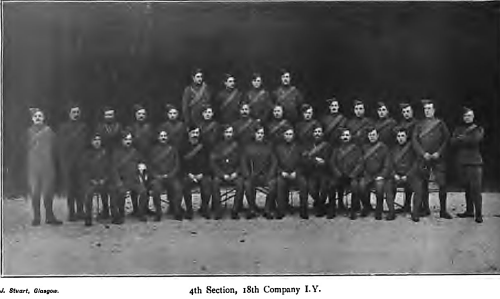
 EXCEPT for
the crowds of kharki-clad men in the streets, Bloemfontein hardly looked
like a town in the midst of a desolate, war-wasted country. Ladies who, to
our non-critical eyes, appeared to be gaily and fashionably attired,
promenaded the streets, and the shops were well stocked with all sorts of
things which filled our souls with longing. But the paymaster was in Cape
Town —we heard stories of fine fishing expeditions to Simons Bay, money was
hard to get, though there was several months' pay in arrears. In the
evenings we went to the theatre, almost with one accord, and though we may
forget "Jim the Penman," we will always be reminded of those nights in
Bloemfontein when we hear the song, then new to us, about "The Navy! the
British Navy!" It was sung with profuse apologies to the Army, of which the
audience was almost entirely composed. EXCEPT for
the crowds of kharki-clad men in the streets, Bloemfontein hardly looked
like a town in the midst of a desolate, war-wasted country. Ladies who, to
our non-critical eyes, appeared to be gaily and fashionably attired,
promenaded the streets, and the shops were well stocked with all sorts of
things which filled our souls with longing. But the paymaster was in Cape
Town —we heard stories of fine fishing expeditions to Simons Bay, money was
hard to get, though there was several months' pay in arrears. In the
evenings we went to the theatre, almost with one accord, and though we may
forget "Jim the Penman," we will always be reminded of those nights in
Bloemfontein when we hear the song, then new to us, about "The Navy! the
British Navy!" It was sung with profuse apologies to the Army, of which the
audience was almost entirely composed.
On 14th March our
column left Bloemfontein on an expedition to clear the district between
Ladybrand, Ficksburg, and Winburg. Our marches, as a rule, were short, from
ten to fifteen miles, but whenever we got settled in camp, patrols were
despatched with waggons to bring in the families from all farms within a
radius of eight or ten miles.
Trekking eastwards towards
Ficksburg, we passed to the north of Thaba N'chu, and on the fifth day
reached a hill called Ratzan Kop. From there, early next morning, a patrol
under Major Campbell, consisting of Yeomanry and two horse-guns, was sent to
clear several farms in the direction of Mequatling's Nek. We were hardly
clear of the camp pickets when the Boers attacked us, but they were not in
great numbers, and we passed steadily on from farm to farm. The last on our
list was fourteen miles out, and between the resistance offered by the Boers
and soft ground in which the waggons were constantly sticking, we did not
reach it till four o'clock in the afternoon. There too, we lost a lot of
time, for the old frau was refractory and could not be got to mount the
waggon beside her husband without a lot of persuasion both from him and from
us. Soon after we started back it got dark, and we were further delayed when
the waggon on which the old couple were perched slipped sideways off the
road, going up from a spruit, and stuck in a donga six feet deep, whence our
united efforts could not move it. Though we had taken a different route and
eluded the Boers, whom we suspected would be waiting for us on the road by
which we had gone out, we did not get into camp till far on Into the night.
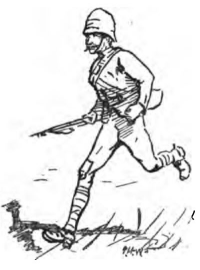 On the 22nd
we marched through Modder Poort to Wet Spruit, near Clocolan, where we
remained for two days, and were sent out patrolling. On the first day, after
touching at a farm from which the Boers themselves had removed everything
except about 2000 bags of wheat, the 17th Company went on to another, while
we rounded up a few horses and some large herds of cattle. The Ayr men had
just reached the farm when some Boers opened fire from a high ridge above
it. The girls of the house, aware of what was coming, were on the lookout,
and danced with delight to see the British run for cover. The fire was heavy
and well-directed, and the Boers kept so well hidden that our men could see
no one to aim at, and eventually had to retire empty-handed. But we went
back next day with a gun and the laugh was then on our side. On the 22nd
we marched through Modder Poort to Wet Spruit, near Clocolan, where we
remained for two days, and were sent out patrolling. On the first day, after
touching at a farm from which the Boers themselves had removed everything
except about 2000 bags of wheat, the 17th Company went on to another, while
we rounded up a few horses and some large herds of cattle. The Ayr men had
just reached the farm when some Boers opened fire from a high ridge above
it. The girls of the house, aware of what was coming, were on the lookout,
and danced with delight to see the British run for cover. The fire was heavy
and well-directed, and the Boers kept so well hidden that our men could see
no one to aim at, and eventually had to retire empty-handed. But we went
back next day with a gun and the laugh was then on our side.
The enemy generally did little but snipe at us when the whole column was on
the march, but made strenuous efforts to hold up and punish the patrols.
They could guess, of course, which farms we would visit from any particular
base, and would lie in wait for us along the road. What data the staff had
to go on when fixing the size of our patrols we never could tell, but they
managed wonderfully to adjust our numbers to the strength of Boers we would
meet. Probably this was in great measure due to one of the staff
Intelligence Officers—Major Gale, of Remington's Scouts. Mounted on a
scraggy but wiry pony, and carrying a telescope as large as a Maxim gun, he
was a well-known figure to every man in the column as he rode about followed
by half-a-dozen jabbering native guides. To be sure, the time came now and
again when a weak patrol was met by the enemy in force, and it took hard
work on the part of both officers and men to prevent a disaster. There is no
doubt, too, that the keen and energetic nature of our commander influenced
the men of all ranks in the column, and reduced the tendency amongst them to
become careless and inconsequent, thus going a great way to prevent the
occurrence of any unfortunate incidents, such as have too often stained the
glory of British arms under later phases of the war.
On the
26th we marched through Clocolan to Prynsburg and had two more days
patrolling from there. The Boers were gathering in greater force and opposed
us most obstinately. The mobility of the column was now greatly reduced by
the convoy of refugees and the great herds of cattle we had to take about
with us; so, being quite near Ficksburg, they were all sent in there on 29th
March, while the column, relieved of its burden, trekked back to Modder
Poort. Very little escort was sent with the refugee waggons, but some twenty
of us, with two officers, were posted on the top of a kopje to see that they
got safely into the hands of the Ficksburg garrison which was out to meet
them. The column would be ten miles on the road to Modder Poort before we
left the hill to rejoin it, and we proceeded with great caution, for much
firing and shelling had been heard during the forenoon, and it was quite
expected that the Boers would be waiting for us somewhere on the road. Sure
enough, before we had gone three miles, seven or eight appeared on a hill on
our right and began to fire on us. While the officers were considering
whether we should attack them, other ten appeared near a drift we had to
cross, and it was decided to push on without delay, for the sound of firing
seemed likely to attract Boers from all quarters. Four or five of the best
mounted men were left to hold the enemy in check while the rest found a
crossing farther down the stream, and eventually we all got safely into camp
before dark.
Major Campbell and the 17th Company had been
in a hot corner during the day, having been volleyed at by some men of the
King's Own Scottish Borderers, while engaging Boers on the other side. It
took a long time to convince the former that they were firing on friends.
On the last day of March, after some fighting, our force occupied
Mequatling's Nek—a dangerous pass beside the Korannaberg Mountain, which had
long been known as the headquarters of a large commando. Owing to the wild
and rugged nature of the country, it required the utmost vigilance on the
part of those on picket and observation post to save their skins from the
Boer snipers, who kept moving about round the camp, indulging in
long-distance shooting, and creeping up near when they could.
On 1st April, among the many heliograph messages sent from Thaba N'chu there
was one affecting us. It announced that four men from each company could get
their discharge and go home at once. Perhaps the people at the Yeomanry
headquarters gave this sop expecting to put us in a good humour; but how we
fumed and raged! After sticking to our work so long, always looking forward
to arrive back in Scotland together, here we were to be sent back in paltry
driblets! Our inclination was to refuse the offer, and wait on till we could
all get away at once; but it was impossible to get everybody to act as one.
In our company lots were drawn, and in the Ayrshire Company urgent cases
were submitted for arbitration, and the four apparently most needed at home
were selected to go.
Two days afterwards, on leaving
Mequatling's Nek, fourteen Yeomanry and M.I. were left in ambush in a house
beside the camp to trap the Boers should any come, as they were in the habit
of doing, to search the ground for ammunition. On this occasion, however,
they were very cautious, hanging around in the distance as though they
suspected something, so that, after waiting five hours, our men had to leave
the house and follow after the column.
On 4th April we reached Mooi Water, a farm about a day's
march from Thaba N'chu.
When we turned west from near
Ficksburg the farm- clearing process was continued, and we had again a large
convoy of refugees. The women suffered their enforced removal in very
different ways. Many, evidently reduced to great straits from lack of food,
were anxious to be removed, and would begin to get their goods together as
soon as we came in sight. Some brought out their Bibles and cursed us
roundly in high-pitched, hysterical voices, refusing to be quieted; while
others hid their feelings, whatever they were, and chatted with us, cracking
jokes while we bundled them out. In general their callousness rendered our
disagreeable task easier, for it made it difficult for us to believe that
these dour-faced, sullen women could be possessed of such delicate feelings
as we know would be roused in our own women-folk in such circumstances.
Often our sympathy was alienated by their deceitfulness, and our hearts were
hardened and our tempers roused by the brutal way in which so many of them
gloated over the number of our men whom their husbands and brothers boasted
of having sniped. At other times, however, more kindly feelings prevailed,
and we were able to appreciate what it really meant to these poor people to
be torn from their homes and set to face an unknown fate which could not but
fill them with dread and foreboding. Often in the cool of the evening
twilight, as the waggons rumbled into camp, the Boer women would join in
singing their "Volkslied" to raise their drooping spirits, and we have been
more touched than was consistent with our peace of mind, in view of having
probably to rout out more on the morrow. It was impossible also not to be to
some extent in sympathy with their very general desire for the war to go on.
They heard but little of disasters happening to their own side, but plenty
of the bravery and success of immediate friends, so remained with an
unshaken belief that their side would ultimately win. One of the greatest
trials of their removal to a concentration camp must have been the
disillusionment on this point. Apart too, from the fact that the removal of
families from the farms increased a hundredfold the difficulties of storing
and redistributing ammunition and supplies, the loss of their moral support
and sympathy must have been one of the severest blows to the Boer men. The
most disheartened and dispirited among them would go out again, like a giant
refreshed, after a ten days' holiday at a friendly farm, coddled, loved, and
idolised by a houseful of women, and flattered into fancying himself a hero
and a patriot.
As far as one can judge, there is little of
either heroism or patriotism among the men on commando now. They compel
neither one's admiration, respect, nor pity. Commandeering their food and
supplies throughout the country, and lifting their clothing from towns when
occasion offers, they are probably a hundred times better fed, better
clothed, and better mounted than ever in their lives before. Rendered
desperate by deeds of violence, they are afraid to surrender, and, besides,
they must now be to a great extent intoxicated by the wild excitement of
their perilous and adventurous existence.
Mool Water
continued to be our headquarters for over a week. During the first two days
all farms in the neighbourhood were cleared. Next day we rested, and a
convoy arrived from Thaba N'chu with mails; then at night a strong patrol of
Yeomanry and M. I. with two guns, under Colonel Pilcher, set off to attack
the Boers in the Korannaberg.
The top of the hill forms a
large undulating grassy plateau, about five miles long by one to
one-and-a-half broad, on which there is a farm and several kaffir kraals.
After about six hours' marching we arrived at the foot of the bill, and a
company of M. I. were sent up, while it was still dark, by one of the only
two paths leading on to the plateau, in order to cover the ascent of the
guns and main body. Whenever it became light the guns started. The road was
a mere bridle path, steep, rough, and narrow, and at every turn it appeared
that insurmountable obstacles barred the way. But the horses struggled on
grandly —eight big strong beasts in each limber, straining to their utmost,
and clawing the ground like cats—and after frequent rests they managed to
the top without a hitch. We were all crowding up the path, Yeomanry and
regulars together, some in front of the guns and some behind, and had just
gained the brow of the hill, when, to our surprise, we came under a smart
fire. The advance party seemed to have reached the top before the Boers got
the alarm, and we had expected them to be sufficiently far forward on the
hill to protect the top of the path. The companies were all mixed up, but
almost mechanically the horses were hurried down under shelter and we
clambered forward, rifle in hand, to see what was the matter. Those who were
firing at us were lying close under cover, and all we could see were a few
Boers riding up and down in the distance. A number of our fellows at once
began to shoot in the direction from which the bullets were coming, but word
was soon passed round to stop. The men in front of us were our own advance
party—our old friends, the K.O.S.B. M.I., with whom the Ayrshire men had
such trouble a few days before. It was a disagreeable moment for all,
because the Boers were pressing the K.O.S.B. on the farther side, and were
also getting in some long distance shooting at us, to 'which in the muddle '
we were quite unable to reply. When we taxed the Borderers about it
afterwards they said they had not been given the slightest idea why they
were sent up the hill, and had certainly not been expecting us to follow
them. Probably the officer in charge knew, but when the trouble began his
men would be too much scattered, and too much taken up with the enemy in
front to receive an order quickly. How they could have taken a Royal Horse
gun with eight horses for Boers beats us, however, and they must have seen
it, for they wounded one of the team. In the scrimmage a man of the Border
Company was shot. This unfortunate affair delayed us an hour, and lost us
all chance of capturing any of the Boers.
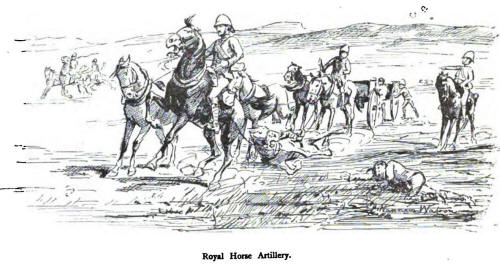
By-and-by we began to move along the top of the hill— M. I. on the right,
and Yeomanry with the guns on the left. We were passing below a cliff about
forty feet high when a sharp volley came from some rocks close in front.
There was a scurry for cover among the boulders at the base of the cliff,
and the guns were out of sight almost before we were; all we could see when
we looked back were the two muzzles sticking out beyond some rocks. One of
our fellows was shot in the foot while in the act of dismounting. A gun was
quickly wheeled out a few yards by hand, and some shells were sent screaming
over our heads which soon dislodged the enemy. Under Captain Coats we were
sent to make a flanking movement on the left, and after a hard and exciting
gallop occupied a hill parallel with the enemy's new position. To reach the
hill we had to ride up a bare hog-backed ridge, and having seen Boers all
along the top before we started, we were painfully sure we were in for a
cutting-up. The nearer we got to the top the more anxiously did we await the
dreaded volley, but it never came, for the Boers had fled! The Ayr men were
not so fortunate. Galloping forward in the centre, they came under a sniping
fire, and one of them was severely wounded, the bullet passing through his
neck. Shortly afterwards we were left in possession of the
entire hill, but as far as we could tell the Boer casualties would not equal
ours. We bivouacked for the night on the plateau, and next morning left to
return to Mooi Water. We lost a guide that day—a fine, pawky, cool-headed
old Scotsman named Carmichael, who had long been settled in the district and
knew it well. He had expressed his opinion that no Boers had returned to the
hill during the night, and went away by himself to have a look round, but
never rejoined us. We have often speculated as to how he met his death, for
killed he must assuredly have been. It is not likely he would surrender, for
he knew, and often used to tell us, that the Boers if they caught him, would
show him no mercy. The guides we picked up through the country—mostly
half-breeds of some sort—were quite the poorest class of men we have seen,
becoming absolutely useless from terror as soon as a shot was fired. We
deeply regretted the loss of such a splendid exception as was our
fellow-countryman Carmichael.
The day after this a large
draft of the new Yeomanry arrived at our camp—,"The Five Shilling Yeomanry"
as they were called, to distinguish them from us the "One-and-five-penny
men"; though, of course, we also were then in receipt of five shillings a
day. With them came twenty veterans under Captain Gilmour—all that were left
together of the original Fife Company. It was the actual beginning of the
end for us, but there was still another month's trekking before us ere we
got clear away.
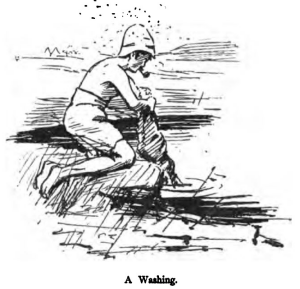
We were somewhat disappointed with the new men. They were absolutely
untrained. Though all were supposed to have had three weeks' training at
Aldershot, many had not been on a horse since passing a perfunctory riding
test till they were mounted at Bloemfontein to come out and join us. It was
most disgraceful mismanagement to send such men into active service. Pilcher
had us all paraded, and gave us a lecture. He said, among other things, that
he hoped the old hands would do their best to render the newcomers as
efficient as possible before leaving—that indeed we were not likely to get
away till they were efficient. We found it rather amusing working along with
them. They brought to our recollection our own first sensations—always
wanting to be out on patrols, and anxious to see the enemy. They were all
made miserable one night because a shower on as old soldiers; but the first
few days' work cleared them pretty quickly of most of their sentimental
ideas. Trekking out towards the north end of the
Korannaberg, the column met with considerable resistance, but most of the
work was done by the Artillery and the M. I. On 16th April, however, after
only three days' trekking, the new fellows got a good taste of what they
were so anxious for. Early in the morning patrols were despatched in all
directions. The Ayr men, new and old, were Out under Major Campbell, and had
some brisk work. They had one man wounded—shot in the leg. Half of our men
were out in another direction along with some M.I. and a gun, and stubborn
resistance was offered them almost all day. At one time a part of the force
was occupying a farm, but the men were unable to move for a heavy cross-fire
kept up by Boers on two small kopjes in front. A sergeant and ten of our men
were ordered to clear one of them, thought to be held by about seventeen of
the enemy. Galloping out round a wall, they came at once under fire, but
before they had gone more than half-way to the hill the Boers took fright,
and, standing up, they fired a few last rounds before they bolted, seriously
wounding one of the new Yeomen and bringing down three horses.
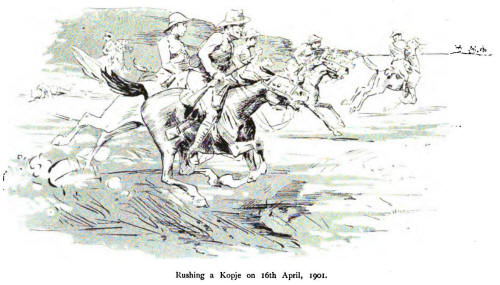
Next day they were in the thick of it again. The column marched twelve miles
in the forenoon, and, after an hour's rest, half of each company were
ordered out on patrol. The farm to be visited lay below a hill, and on
nearing it we were pulled up sharply by a heavy fire from an invisible
enemy. Our men lined out, and the pom-pom shelled the bill, but the Boers
had such excellent cover that nothing was effected. A party tried to ride
over to the farm but were turned, and it seemed as if nothing could be done,
for our numbers were too small to outflank the hill. At this time seven of
us who had been Out on a flank rode up, and Major Campbell ordered us to
dash into the farm while he tried to distract the attention of the Boers by
a heavy fusilade and some rounds from the porn-porn. We were to ascertain
whether the farm was occupied or not, and if it contained forage. A wire
fence, in which we had to find an opening, barred the way, and the Boers
were not more than five or six hundred yards off, but we got safely under
cover of a high stone wall about forty yards from the house. Here two men
were left with the horses, and the rest ran over on foot. Fortunately the
sun was low behind us, and shone right into the eyes of the Boers. The farm
was empty. When we returned to our horses Major Campbell and two other men
had come up, and we had to run the gauntlet again as we galloped away in
twos and threes.
One of these days we saw as fine a bit of
artillery practice from "U" Battery as could be seen. Passing near a hill,
the column was sniped at by Boers on the crest of it. The guns, of course,
were turned on them at once, and it seems some M.I. had got behind the hill
and prevented their escape except along the ridge, which was quite exposed
to the artillery fire. We were all halted, and lay about on the grass
watching through our glasses. Whenever a Boer showed himself a shell would
burst beside him; and whenever any were seen to take cover, the spot would
be searched till there was little chance of their being left alive. The
convoy came up and was parked besides us, and the native drivers went into
ecstasies. Whenever an extra fine shot was fired, a wave of interjection
would break out—" Ah!" The M. I. who went up on the hill came back with
stories of eleven killed and many wounded, but we never heard an official
report on the matter.
On the 19th we were back at Trommel,
and during a long gallop after some Boers we were again fired on by the
K.O.S.B., but no damage was done. We made another night march to Leeuw Kop,
under circumstances much the same as before, but it was no more successful,
the information this time being at fault.
In three more
days we were back near Winburg again, and got more mails. Here Lieutenant
Marshall left us to go home. He was the youngest subaltern, but was a
splendid officer and a favourite with both companies. The monotony never
spoiled him as it did others, for he remained keen and plucky to the end.
On the evening of the 23rd we began a long and trying night march into
Senekal. Everyone was painfully sleepy and tired—perhaps we had not got over
the effects of the march to Leeuw Kop, three nights before.
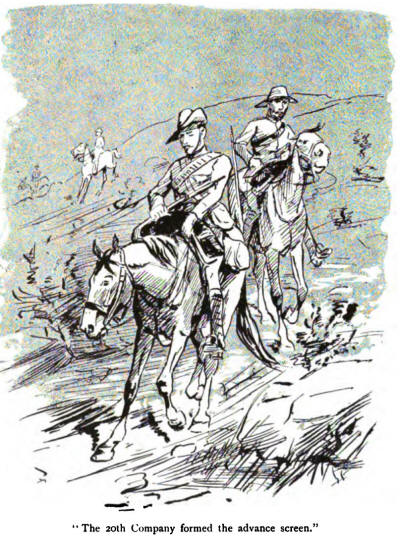
From Senekal
three days hard marching brought us to within a few miles of Reitz, and next
day the Yeomanry were sent on to destroy it. Our orders were to burn all
stores and render the houses uninhabitable, by smashing windows and breaking
off doors. The town was empty but for the Landrost and his family, also a
wounded Colonial, who had been captured and then wilfully shot. The rest of
the women and children had been removed by the Boers, in order that they
should not be sent to a concentration camp, but the heavy ox waggons in
which they trekked with all their property so hampered the enemies'
movements that we were almost sure to make up on them sooner or later and
capture their laager. Indeed, only two days before, we had captured
twenty-seven waggons containing many of the Reitz families.
On 20th April, returning towards Senekal, we had what proved to be one of
our last encounters with the Boers. The 20th Company formed the advance
screen, with 17th and 18th Companies in support on the left and right flanks
respectively. The screen came into touch with some snipers while the column
was crossing a drift, and in a few minutes Captain Gilmour sent back word
that a small Boer convoy was in sight, trekking hard a couple of miles
ahead. Forward we started at a gallop, and did not stop till we made up on
the last three waggons, while the Boers fled incontinently, leaving the
women to their fate. The Ayr men coming up from their side Went on, and
captured other two waggons and a Cape-cart
Our experience
has been that Boer courage was a very variable quality, at least in the
later stages of the war. At Bothaville the men shut in around the farm shot
straight and fought obstinately, hoping to save their guns by holding out
till their comrades could drive us off. At Tobaksberg, owing to their
numbers, they were dangerous opponents; and occasionally at other times,
when conditions were altogether in their favour, they made a good stand and
pressed us hard. But months of fighting—driving the Boers before us day
after day—and always with a small casualty list, hardly suggest
keenly-contested encounters; and it seemed to us that any show of dash and
spirit completely demoralised them.
On 2nd May we were
again at Senekal and marched thence to Ventersburg, which had been destroyed
by Bruce Hamilton, and on to Ventersburg Road.
One of these
days we had absolutely our last encounter with the Boers. We were out on
patrol with the 17th Company, when four waggons and a Cape-cart were
captured without much opposition.
Several hundreds of the
new Yeomanry were at Venters- burg Road Station awaiting the arrival of our
column, and we began to hope we might all get away there and then. Colonel
Pilcher, however, seemed unwilling to lose us, and said the best he could
offer was to allow 25 per cent. to leave at once, and have the rest stay on
till the new men were more efficient. The proposal was badly received, for
it was too indefinite, and meant the breaking up of the companies, which we
were so anxious to avoid. Later an officer on General Knox's staff arrived
to arrange the matter, and we were better pleased when Colonel Campbell's
suggestion was agreed to—that we should all trek for a fortnight longer and
then get off together. Almost all the old men were promoted to be sergeants
and corporals, and arrangements were made to drill and instruct the
newcomers, and teach them as much as possible in the limited time.
A grand concert was held at night in celebration of this our first definite
order about going home. Colonel Campbell occupied the chair, and
representatives were present from the Artillery, M.I., and Army Service
Corps. Late at night, when we were mostly asleep, a
telegram arrived from headquarters saying that the 18th Company, under
Captain Coats, could go home. What a scene there was next morning-12th
May—when we heard the news! Orders were given to hand over our horses and
saddlery to the new men, and march on foot to the station at six o'clock.
Soon we were swinging out of the camp, to the strain of the "Cock o' the
North," the envy of all the rest. We were in dread lest we might after all
be turned at the station, but General Knox, seeing the telegram, said it was
all right. Before we steamed out of the station Colonel Pilcher came and
bade us good-bye. Now that we were actually on the train going home it was
easy to forgive him for having tried to keep us, and we could not but
remember for how much we had to thank him during all the time we were under
his command.
|

